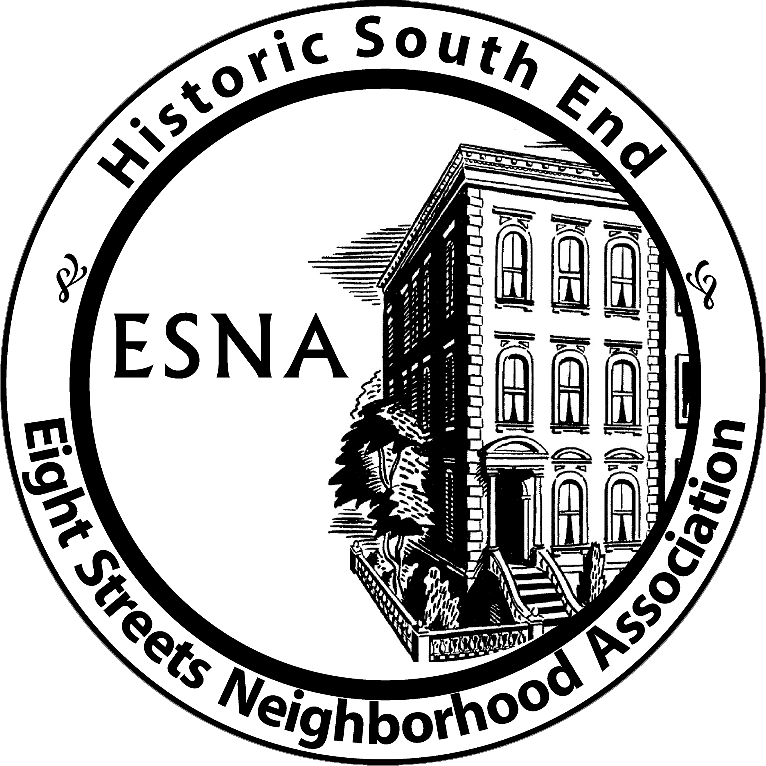The Sahara building
Original blog entry here.
Text reposted below in case the blog goes away.
Closed For Nearly 50 Years: A History Of The Sahara Syrian Restaurant
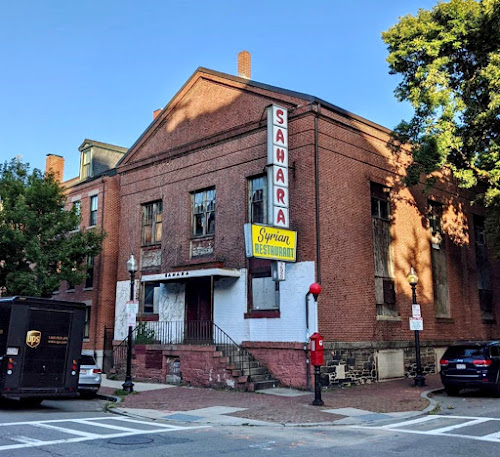
(Photo courtesy of Patrick Maguire)
It's an iconic sign on Shawmut Avenue in Boston's South End, yet the restaurant itself has been closed for nearly fifty years. The building has largely remained unused for all these years, except as a storage place by its current owners. It's obviously a valuable piece of property and its unfortunate that after all these years it hasn't been transformed into another restaurant or other commercial business.
Although many people are aware of the restaurant sign, the history of the restaurant itself is much less known. That history is quite fascinating, including attempts to start a new restaurant at that location, as well as to create a new location of the Sahara. And what is the connection of an ex-belly dancer to the Sahara? Let me offer some of the interesting history of the Sahara restaurant and its location.
The building itself extends back to the middle of the 19th century. According to the Boston Globe, October 24, 2004, “The Greek Revival-style building was built by the German Lutheran Society of Boston, which opened it as a church in 1847. Services were held exclusively in German for almost 40 years,…” In 1898, it was then sold to the Calvary Baptist Church, but ended up being repossessed in 1915.
Through the Suffolk County Registry of Deeds, and searching in the Unindexed Property records, I was able to track ownership of the property which later became the Sahara restaurant. In 1924, John P. Vaccaro sold the property to Hovhannes Zovickian, Mourad P. Mouradian, and Kabriel S. Papazian. Two years later, in 1926, those three men sold the property to the Baikar Association, Inc.
The Boston Globe, December 31, 1934, indicated this organization, which was founded and headquartered in Boston, had over 40,000 Armenian members across the country. It was said to be the "largest patriotic and educational Armenian society in the country," with 102 branches across the U.S. The organization also published an Armenian newspaper, and it appears the printing occurred at the Shawmut Avenue property. In addition, the North Adams Transcript, June 8, 1934, indicated the property was occupied by the Armenian Democratic Liberal (ADL) party.
The Baikar Association owned this property for about 37 years, when, in July 1963, they sold the property to Victoria K. Matta, a widow, for $8,000. This will take on more importance later in this article.
************
As I wrote previously, the earliest Syrian immigrants to Boston formed their own community, Little Syria, which was adjacent to and overlapped Chinatown. However, from 1920 to 1945, Syrian immigrants started branching out from Little Syria, settling in other sections of Boston, including the South End, especially around Shawmut Avenue. In these new neighborhoods, they opened Syrian businesses, from grocery stores to restaurant.
For example, one of the important Syrian businesses was the Syrian Grocery Importing Co., at 270 Shawmut Avenue, which opened in 1940, and still is in operation today. There was even an earlier Syrian grocery store in this area, which existed at least since 1933, at 452 Shawmut Avenue, and was owned by Khorean Tchuljian. 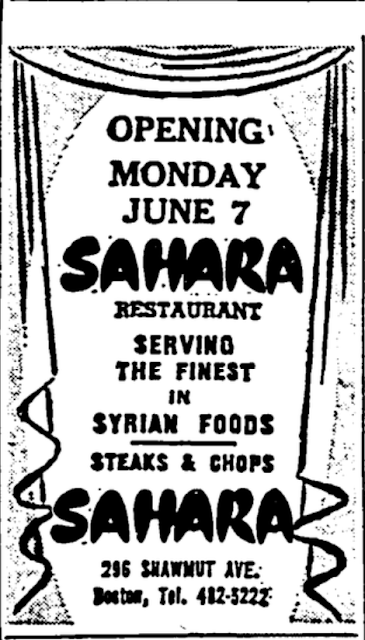
The first reference I found to the Sahara restaurant was an advertisement in the Boston Herald, June 4, 1965. The restaurant, located at 296 Shawmut Avenue, planned to open on Monday, June 7, and would serve "the finest in Syrian foods" as well as steaks & chops. On that same date, the Boston Traveler, June 4, 1965, mentioned the upcoming opening of Sam Khoury’s Sahara restaurant, where the feature of the house would be shish-ka-bab. Sam Khoury may have been the owner of the restaurant, though he was renting the space from the property owner, Victoria Matta.
Several days after the restaurant's opening, the Boston Herald, June 11, 1965, briefly stated: “Fine Syrian foods are served at the Sahara Restaurant on Shawmut Avenue in Boston. While Shish-ka-bab is the gourmet delight here, you may also partake of their fabulous lamb delicacies if you’ve a mind to.”
A little more information was provided in the Boston Herald, July 9, 1965, noting: “Curried rice pilaf, various ka-bobs and wonderful lamb dishes are the order at the Sahara Restaurant in Boston. Wall to wall red carpeting adorns the floors, and the walls are a walnut paneling, making for a pleasant dining atmosphere.”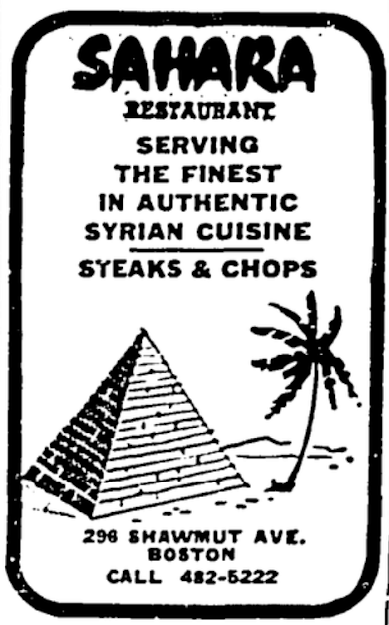
The Boston Herald, July 16, 1965, offered a new advertisement for the Sahara restaurant, with a pyramid and palm tree.
Months later, the Boston Herald, November 12, 1965, noted that the Sahara was open until 3am each night, offering "shishkabobs," lamb dishes, and “tempting pastry.” 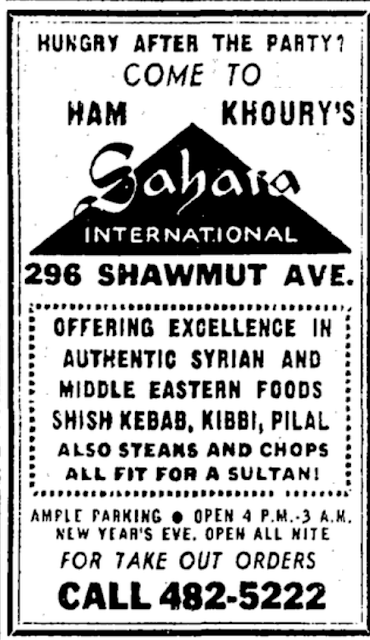
There was another new advertisement in the Boston Record American, December 27, 1965, though it misspelled Sam Khoury's first name. The restaurant was open from 4pm-3am, and offered take-out too. The ad also mentioned the restaurant served Shish Kebab, Kibbi, Pilal, Steaks and Chops.
It's curious that during this time, the Boston Globe didn't mention the Sahara restaurant. The restaurant apparently didn't advertise in the Globe, and the Globe didn't review the restaurant or even acknowledge its existence.
The most extensive newspaper article about the Sahara was in The Mass Media, February 28, 1972, a UMass Boston paper. This was essentially a restaurant review, but the article also needed editing as it had a number of mispellings. It began stating that the Sahara was a “Syrian-Lebanese restaurant, at 296 ½ Shawmut Ave. in the South End.” The article continued, “The décor was a kind of modern American tastless with Mediterranean overtones. It was generally clean and unoffensive. The service was efficient and friendly, yet there is always a good fifteen to twenty minite wait for your food after you have ordered.”
There was then descriptions of a number of dishes they sampled. They began with an appetizer of Hommus Bit Heeny, "mashed chick peas with taheeny and lemon juice." They described it as, “Well, it’s a paste in which you dip your unleven Syrian bread, top with an onion and sprinkle lemon juice on"; and noted, “Its really quite good, but it may take a bit or two before you decide this.”
For a main course, they tried the La’hm Mishwi Mushroom ($3.25), lamb chunks with charcoal broiled mushrooms served with rice pilaf. They thought it was excellent and “The meat, especially deserves a singular mention.” They also had Chicken & Hushwee, “The Queen of the Lebanese Dishes,” but thought it was “overated. Its slices of boned chicken, diced lamb meat, snoobar, and rice pilaf tended to be rather bland.”
The Wara Eneb ($2.40) were grape leaves stuffed with lamb, rice, spices, and cooked in lemon sauce, and found to be “a totally different gastronomical experience.” They also sampled the Flyflee Mishee ($2.40), green peppers stuffed with lamb, spices, cooked in tomatoe sauce. And the Mishee Malloof ($2.40), rolled cabbage was stuffed and cooked with the same concoction.
They concluded that, “The food at the Sahara is generally well prepared and tasty, but it is exotic, so if you don’t have much imagination are aren’t willing ti try something new, stay away, for this isn’t the place for you.”
Maybe the most intriguing part of the review though was some brief comments about the alleged owner of the restaurant. Previous information seemed to indicate that Sam Khoury was the owner, but it's very possible that there were multiple owners. The article claimed that the owner was an ex-belly dancer, who recently "traded in her pink Eldorado (complete with a fake velvet roof) for a larger baby blue Cadillac.”
Unfortunately, the article didn't provide her name, making it more difficult to find any information about her. And this was the only article I found mentioning any such female owner. However, could the property owner, Victoria Matta, also have been an ex-belly dancer and a part-owner of the Sahara restaurant as well? I haven't been able to find much else about Victoria so it is difficult to determine if she were involved in the restaurant or not.
Some time later in 1972, the Sahara restaurant closed, having been open for only eight years, and I wasn't able to find any definitive information as for the reasons for its closure. One possibility is that Khoury had issues with the new property owner, who purchased the spot in January 1972. Victoria Matta sold the property to Charles J. Matta for $6,307, the amount of the outstanding mortgage. Victoria and Charles may have been related.
However, losing the Sahara didn't prevent Khoury's desire to be involved in the restaurant industry. He had plans to open another restaurant, down the street from the original location, and call it The New Sahara.
As for its owner, Sam Khoury, there's an intriguing article about him fifteen years before the opening of the Sahara restaurant. The Boston Globe, May 4, 1950, reported on the arrest of two 14 year old boys who stole a number of items from one of the boys' homes. The items included a camera, silver set, radio, rifle, watch and two lamps. Samuel Khoury, age 26, of 293 Shawmut Avenue, was also arrested at this time. Samuel, a prospective bridegroom, was accused of buying the stolen items from the two boys, wanting to use the items to decorate his home for his new bride. Khoury admitted to being guilty of receiving stolen property and he was fined $100, received a suspended sentence of 4 months, and put on probation for a year.
After the Sahara restaurant closed, the Boston Globe, July 8, 1973, noted that Samuel was now a principal in the Kenwood Development Co., developers of a property site at Dwight Street and Shawmut Avenue. The development was supposed to include ten one-bedroom units, 6 two-bedroom units, and a 218 seat restaurant, The New Sahara. Samuel was still living at 293 Shawmut Avenue and was noted as the former owner of the Sahara restaurant. However, the plans for The New Sahara never came to fruition. Another unfortunate situation.
Once the Sahara closed, the new property owner, Charles Matta decided he wanted to operate a restaurant. In October 1972, Matta applied for a license license for that location, and it's unclear whether the new owner was going to keep the name of the Sahara or change it to something else. This also seems to indicate that the Sahara restaurant might not have had a liquor license, as if so, Matta would have just applied for a transfer of their licenses rather than making an entirely new application.
It seems that Matta received an initial denial, as he had to approach the Board of Appeals in January 1973, seeking an alcohol license as well as a waiver of the requirement for so much off-street parking. I couldn't locate the results of this appeal but as no new restaurant ever arose from that spot, it seems likely Matta was unable to receive the license he desired.
Matta held onto the property for a few years, doing nothing with the building, and in July 1975, he made Fred T. Mather, Sr. a tenant in common for $35,000. A year later, Matta and Mather sold their interests in this property to Margaret Mansour for $42,000. And the Mansour family continues to own this property to the present day.
Margaret was born in Boston and married Maurice Mansour, from Lebanon, around 1952. They eventually had four children George, Montgomery, Ramon and Joseph. In 1975, the Mansour purchased the Syrian Grocery Importing Co., which the family still owns and operates. Unfortunately, George died of cancer around 1987, Margaret died about ten years later, and Maurice died in 2003. The Mansour family created the MMM Realty Trust in May 1998, incorporating their real estate holdings, including 296 1/2 Shawmut Avenue, and eventually Ramon Mansour became the Trustee of this Trust.
During the last twenty years, there have been concerns about the Sahara restaurant building, many considering it abandoned, an eyesore, and in need of renovation or demolition. The Boston Globe, October 24, 2004, published an article entitled, That Eyesore on the Corner Draws Curiosity—and Concern. The article claimed “..there’s little historical record left of the Sahara restaurant,…” and that it closed in 1970, though the evidence is clear it remained open until 1972.
The article then mentioned that the Mansour family had once considered moving their grocery store to the Sahara restaurant spot but changed their minds. The family had still been considering what to do with the property, and it was noted that some people wanted to purchase the property to open a restaurant. In a brief follow-up, the Boston Globe, October 16, 2005, noted that the Mansour's were using the Sahara property for storage. And in the Boston Globe, October 23, 2005, the Director of the Department of Neighborhood Development evidenced hope that the Mansours would do something with the building.
Fourteen years later, the Boston Globe, June 23, 2019, continued to voice concerns about the Sahara property, and stated that the three Mansour brothers still lacked any plans about what to do with it. The building remained as is, largely abandoned, though with its iconic sign still in place.
For 44 years, the Mansour family has done nothing with the Sahara restaurant property except for use it for storage. There are rumors that contentious family disagreements over what to do with the real estate may be part of the reason the building has remained idle. It's certainly a valuable piece of property and could easily be sold for quite a significant amount. According to the City of Boston, the property was assessed in 2019 at $1,487,000. In comparison, in 1985, the property was assessed at only $59,300.
As the three Mansour brothers get older, the youngest currently being around 58 years old, maybe it will be the next generation that actually does something with the building. It certainly would be great to see a new Syrian restaurant at that location, though any change would probably be good for the neighborhood.
For now, the Sahara restaurant sign remains merely a glimpse into the past, a look back over 50 years ago.
Richard Auffrey at 3:00 AM
